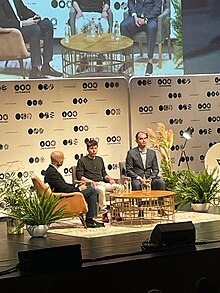elon musk はopenAIの創立社の一人だったが
イーロンを超える創立者がいた。
Ilya Sutskever(ロシア人) だ。
https://en.wikipedia.org/wiki/Ilya_Sutskever
|
Ilya Sutskever
|
|
|---|---|
| Илья Суцкевер | |

Ilya Sutskever (right) with Sam Altman at Tel Aviv University in 2023 |
|
| Born |
Илья Суцкевер 1985 or 1986 (age 36–37)[4] |
| Citizenship | Canadian, Israeli |
| Alma mater | |
| Known for | AlexNet Co-founding OpenAI |
| Scientific career | |
| Fields | Machine learning Neural networks Artificial intelligence Deep learning[1] |
| Institutions | University of Toronto Stanford University Google Brain OpenAI |
| Thesis | Training Recurrent Neural Networks (2013) |
| Doctoral advisor | Geoffrey Hinton[2][3] |
| Website | www |
Ilya Sutskever FRS (Hebrew: איליה סוצקבר; Russian: Илья Суцкевер; /ilja su:ʦkɪvər/ born 1985/86)[4] is a computer scientist working in machine learning,[1] who co-founded and served as board member[7] and Chief Scientist of OpenAI.[8]
He has made several major contributions to the field of deep learning. He is the co-inventor, with Alex Krizhevsky and Geoffrey Hinton, of AlexNet, a convolutional neural network.[9]Sutskever is also one of the many co-authors of the AlphaGo paper.[10]
Early life and education[edit]
Sutskever was born in Nizhny Novgorod, Russia, then called Gorky, at the time part of the Soviet Union, and at age 5 immigrated with his family to Israel.[11] He spent his formative years in Jerusalem.[12]
Sutskever attended the Open University of Israel between 2000 and 2002.[13] After that, he moved to Canada with his family and transferred to the University of Toronto in Ontario.
From the University of Toronto, Sutskever received a Bachelor of Science in mathematics in 2005,[13][14][6][15] a Master of Science in computer science in 2007,[14][16] and a Doctor of Philosophy in computer science in 2013.[3][17][18] His doctoral supervisor was Geoffrey Hinton.[2]
In 2012, Sutskever built AlexNet in collaboration with Hinton and Alex Krizhevsky. To support the computing demands of AlexNet, Sutskever bought many GTX 580 GPUs online.[19]
Career and research[edit]

From November to December 2012, Sutskever spent about two months as a postdoc with Andrew Ng at Stanford University. He then returned to the University of Toronto and joined Hinton's new research company DNNResearch, a spinoff of Hinton's research group. Four months later, in March 2013, Google acquired DNNResearch and hired Sutskever as a research scientist at Google Brain.[20]
At Google Brain, Sutskever worked with Oriol Vinyals and Quoc Viet Le to create the sequence-to-sequence learning algorithm,[21] and worked on TensorFlow.[22]
At the end of 2015, he left Google to become cofounder and chief scientist of the newly founded organization OpenAI.[23][24][25]
In 2023, he announced that he will co-lead OpenAI's new "Superalignment" project, which tries to solve the alignment of superintelligences in 4 years. He wrote that even if superintelligence seems far off, it could happen this decade.[26]
Sutskever was formerly one of the six board members of the non-profit entity which controls OpenAI.[7] The Information speculated that the firing of Sam Altman in part resulted from a conflict over the extent to which the company should commit to AI safety.[27] In a company all-hands shortly after the board meeting, Sutskever stated that firing Altman was "the board doing its duty",[28] though in the following week, he expressed regret at having participated in Altman's ousting.[29] The firing of Altman and resignation of Brockman led to resignation of 3 senior researchers from OpenAI.[30] Following these events, Sutskever stepped down from the board of OpenAI.[31]
Awards and honours[edit]
- 2015, Sutskever was named in MIT Technology Review's 35 Innovators Under 35.[32]
- 2018, Sutskever was the keynote speaker at Nvidia Ntech 2018[33] and AI Frontiers Conference 2018.[34]
- 2022, he was elected a Fellow of the Royal Society (FRS).[21]
